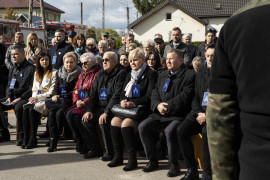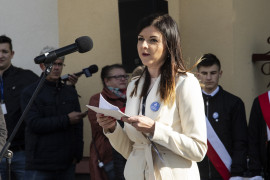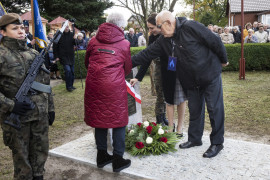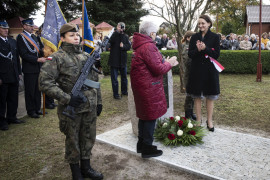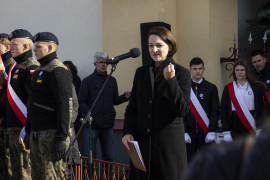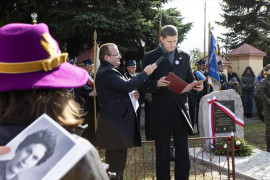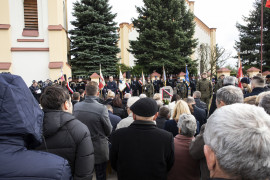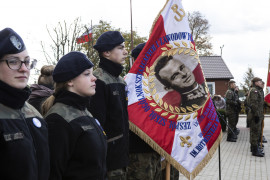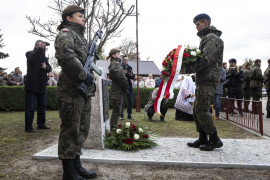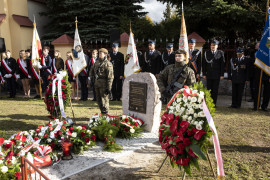A Commemoration of Władysława and Stanisław Krysiewicz - Instytut Pileckiego
The couple were shot for hiding eight Jews. On Sunday, 6 October, in Waniewo near Białystok, we paid tribute to Mr. and Mrs. Krysiewicz and a plaque in their honor was unveiled.
The couple’s children had waited for this gesture for 75 years. The events that happened in the autumn of 1943 impacted the entire lives of the five Krysiewicz children.
The parents of Alicja, Irena, Krystyna, Teresa and Henryk, children aged 3 to 9, had a farm in Waniewo near Białystok. Neither the difficult conditions that they had to contend with during the war, nor the danger from the Germans kept Władysława and Stanisław from helping those in need. Eight Jews ended up staying with the Krysiewiczes in November 1942. The fugitives from the ghetto in nearby Sokoły hid in a shelter that Stanisław prepared for them under the barn. The secret was disclosed ten months later.
During the night from 7 to 8 September 1943, several dozen German gendarmes surrounded the Krysiewiczes’ home. Stanisław was tortured. He was repeatedly hit with a truncheon but did not confess. When the Germans set the farm buildings on fire, the Jews in hiding tried to escape. They were shot. Stanisław, beaten unconscious, was finished off with a shot to the head. Władysława and the children were loaded onto a cart. The woman was well aware what was in store for them and she breathed a sigh of relief when one of the gendarmes let her neighbor take the children. This gesture saved their lives. Władysława was transported to the remand prison in Tykocin. She was shot three days later. The Krysiewicz children survived, but it was not the end of their plight. They were sent to an orphanage, where they were split up. The youngest two were adopted by a foster family and took a different last name. It was only many years later that the siblings reunited.
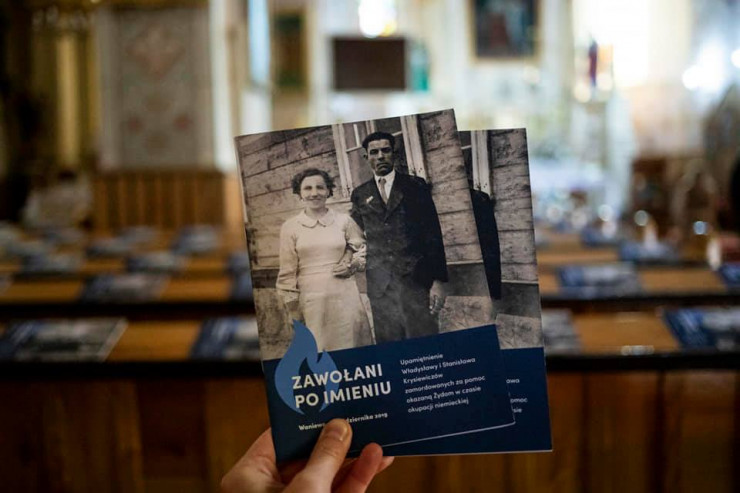
Władysława and Stanisław Krysiewicz were honored as Righteous Among the Nations by Yad Vashem on 25 July 1993, but in Poland they were only remembered by their immediate family. That is why the commemoration in Waniewo had a symbolic significance for the entire family.
The two youngest Krysiewicz children took part in the ceremony: Teresa Grochowska and Henryk Wołoszynowicz, as well as grandchildren and great-grandchildren. “Our knowledge about ourselves is only proportional to how much we have been tried. Władysława and Stanisław Krysiewicz were tried and passed the test of humanity, having the courage to help other human beings. My grandmother and her siblings, the children of Władysława and Stanisław Krysiewicz, as well as other members of our family are very proud of their great-grandparents. They paid the highest price for their deed, but at the same time they transmitted very important values to the next generation; they shaped us,” said Patrycja Wojna, the great-granddaughter of the murdered, on behalf of her whole family.
The unveiling was preceded by Holy Mass at the Church of the Assumption of the Blessed Virgin Mary in Waniewo. “Mr and Mrs Krysiewicz’s faith […] was the great force that gave them the strength to maintain their humanity in those terrifying times,” said the parish priest, Rev. Jan Kukowski, in his homily, recounting the couple’s tragic story. He emphasized both the constant danger that they lived in when sheltering the Jews, as well as the material effort needed to feed not only their own large family but also eight additional adults.
The Krysiewiczes were aware of the fact that they could pay the highest price for breaking the “laws” of the occupier. “Their fate can represent what happened to others like them whom we are commemorating within the framework of the ‘Called by Name’ project. They wanted to save victims of the Holocaust, and they perished along with them. But their death had a profound significance. They left us an exemplary model of courage and solidarity with the oppressed. Today we want to show it not only to the local community but to all Poles,” emphasized Wojciech Kozłowski, Director of the Pilecki Institute.
“It is very important to remember the heroism of those who lived in this land, in this village, to remember the price that their children had to pay,” observed Prof. Magdalena Gawin, Deputy Minister of Culture and National Heritage, initiator of the “Called by Name” project. She appealed to the local authorities and the priests from the local parish to remember the National Day of Remembrance for Poles who rescued Jews during the German occupation, especially since they have their own local heroes.
The ceremony was attended by representatives of Poland’s government authorities: Dr. Barbara Fedyszak-Radziejowska, advisor to the President of the Republic of Poland, Dariusz Piontkowski, Minister of National Education, and Prof. Magdalena Gawin, Deputy Minister of Culture and National Heritage, the initiator of the project. The local community was also present in large numbers. Also present were the hosts of the place: the head of Wysokie Mazowieckie county – Bogdan Zieliński, and the head of Sokoły municipality – Dr. Józef Zajkowski.
See also
- Steve Crawshaw at the Pilecki Institute in Berlin! | Accompanying Event: “Unknown Legacies of the Nuremberg.”
Event
Steve Crawshaw at the Pilecki Institute in Berlin! | Accompanying Event: “Unknown Legacies of the Nuremberg.”
Join us a special event accompanying our two-day international conference “Unknown Legacies of the Nuremberg Trial: Regional Approaches and Perspectives in East Central Europe.”
- Conference: Unknown Legacies of the Nuremberg Trial: Regional Approaches and Perspectives in East Central Europe
conference
Conference: Unknown Legacies of the Nuremberg Trial: Regional Approaches and Perspectives in East Central Europe
We are pleased to invite you to participate in the academic conference "Unknown Legacies of the Nuremberg Trial: Regional Approaches and Perspectives in East Central Europe".
- Film "Soviet Camp 0331"
Event
Film "Soviet Camp 0331"
As part of the program accompanying the opening of the Pilecki Institute headquarters at 82 Sienna Street, we invite you to a screening of a film about the tragic experiences of the inhabitants of the Vilnius region.
